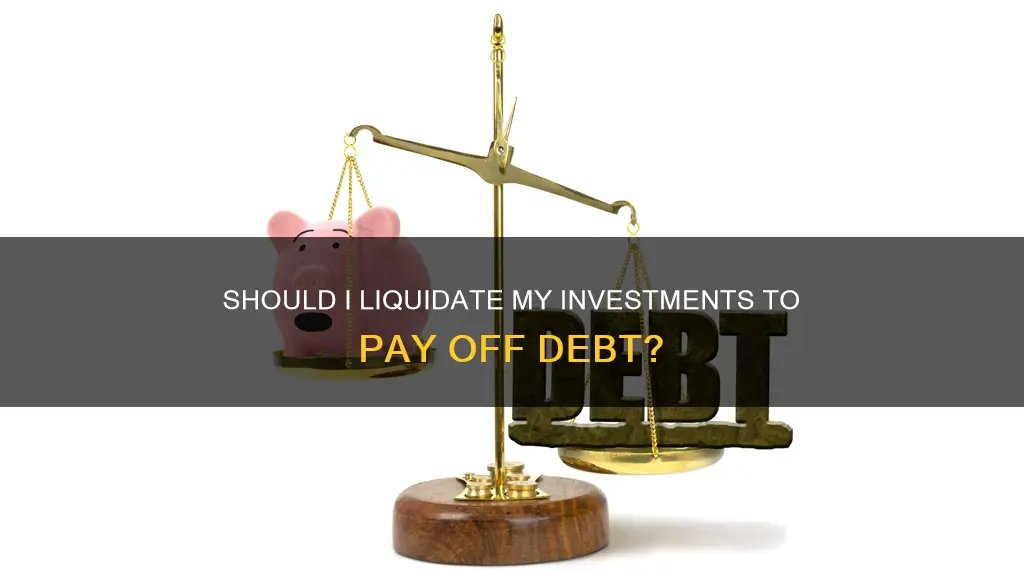
Whether or not you should sell your investments to pay off debt depends on a number of factors, including the type of debt, the interest rate, and the potential future gains of your investments.
If you have high-interest debt, such as credit card debt, it often makes sense to sell investments to pay it off. This is because the interest rates on credit cards can be very high, often exceeding 20%, while the long-term average return of the stock market is about 10%. In this case, it makes mathematical sense to give up potential returns of 10% in the stock market to eliminate a 20% debt.
However, there are several important considerations to keep in mind. Firstly, selling stocks or other investments can result in capital gains tax, which can be as high as 37% if the investments have been held for less than a year. This can significantly reduce the amount of money available to pay off debt. Secondly, selling investments can disrupt your long-term financial plan, as it may result in missing out on future gains and the compounding effect of those gains over time. Finally, selling investments may impact the diversification of your portfolio, potentially requiring additional trades and incurring further capital gains taxes.
Therefore, it is generally recommended to pursue other options for paying off debt before selling investments. This includes balance transfer credit cards, debt consolidation loans, the debt snowball or avalanche method, and borrowing from family or friends. Additionally, it is important to ensure that basic financial security is established by paying minimums, building an emergency fund, and staying on top of credit card debt.
| Characteristics | Values |
|---|---|
| Should you sell investments to pay off debt? | Generally, it is advised to avoid selling investments to pay off debt. However, if you have high-interest debt, it may be worth considering. |
| Types of debt | High-interest debt, such as credit card debt, can carry interest rates above 20%. In such cases, it may be beneficial to sell investments to eliminate the high-interest burden. |
| Investment returns vs. debt interest | If the potential returns on your investments are lower than the interest rate on your debt, it may make sense to prioritise paying off the debt. |
| Tax implications | Selling investments in taxable brokerage accounts may incur capital gains tax, reducing the amount available to pay off debt. |
| Retirement accounts | It is generally advised not to withdraw from retirement accounts like 401(k) or IRA early due to penalties and taxes, which could neutralise any interest savings. |
| Lost future earnings | Selling investments means losing potential future gains and the compounding effect on those gains over time. |
| Disruption to portfolio | Selling assets from a well-diversified portfolio may disrupt its allocations, requiring rebalancing and potentially resulting in additional capital gains taxes. |
| Low-cost alternatives | Consider low-cost alternatives to pay off debt, such as balance transfer credit cards with 0% introductory APR or personal debt consolidation loans with lower interest rates. |
What You'll Learn

Weigh up the interest on your debt against the return on your investments
When deciding whether to sell your investments to pay off your debt, it is important to weigh up the interest on your debt against the return on your investments.
If you have high-interest debt, such as credit card debt, it is generally recommended to prioritise paying off this debt over investing. This is because it is unlikely that your investments will consistently yield a return that is higher than the interest rate on your debt. For example, if you are paying 20% interest on credit card debt, you would need to make at least 20% on your investments just to cover that interest cost, and "no one makes 20% year-over-year".
However, if the interest rate on your debt is lower than the return on your investments, it may make more sense to continue investing rather than paying off your debt. This is because, over time, your investment returns may outpace the interest accruing on your debt, ultimately leaving you better off.
It is also important to consider the tax implications of selling your investments. For example, if you sell investments that you have held for less than a year, you may owe capital gains tax of up to 37%. On the other hand, the interest you pay on a mortgage and student loans may be tax-deductible.
Additionally, it is worth noting that there are alternative options to consider before selling your investments to pay off debt. These include pausing contributions to your investments and redirecting that cash flow towards paying down high-interest debt, or taking out a loan through a portfolio line of credit, which allows you to access your investment money without triggering taxes.
In summary, when deciding whether to sell your investments to pay off debt, it is crucial to compare the interest rate on your debt with the expected return on your investments, taking into account any taxes or other costs associated with selling your investments.
Starbucks Stock: Buy or Bye?
You may want to see also

Consider the tax implications of selling your investments
There are several tax implications to consider before selling your investments to pay off debt. Firstly, if you sell investments in a taxable brokerage account, you'll need to pay capital gains tax on the profits you make from the sale. The amount of tax you pay depends on how long you've held the investments. Investments held for a year or less are subject to short-term capital gains tax, which is the same as the rate on your ordinary income tax. Investments held for longer than a year benefit from a lower, long-term capital gains tax rate.
If you sell mutual funds from a taxable account, you will also owe capital gains tax on any profits. However, if you sell mutual funds from a tax-advantaged retirement account, such as an IRA, you may have to pay income taxes and a 10% early withdrawal penalty if you're below the age of 59 and a half. With a Roth IRA, you can avoid taxes and penalties if you've had the account for at least five years and meet the age requirement.
Additionally, if you take out a loan from your retirement account, such as a 401(k) loan, you may have to pay a 10% penalty and income taxes on the amount you borrowed. If you leave your job, you may have to repay the entire loan within a short period, and if you're unable to do so, it will be treated as a taxable distribution.
Before selling your investments to pay off debt, it's important to consult with a tax specialist to understand the specific tax implications for your situation.
Water Rights: An Investment Guide
You may want to see also

Avoid using your retirement savings to pay off debt
Retirement savings are intended to ensure financial security during your retirement years. While it may be tempting to use these funds to pay off debt, doing so can have serious consequences and should generally be avoided. Here are several reasons why you should avoid using your retirement savings to pay off debt:
Penalties and taxes
Retirement accounts are designed to discourage early withdrawals. Withdrawing funds from retirement accounts before reaching the age of 59½ typically incurs early withdrawal penalties, which can range from 10% to 25% of the withdrawn amount. Additionally, early withdrawals are subject to income tax, resulting in a significant reduction in your overall savings.
Sacrifice of growth potential
The larger reason to avoid dipping into retirement accounts is the loss of growth potential through compound interest. Retirement accounts like 401(k)s and IRAs offer tax-deferred or tax-free growth, allowing your investments to compound over time, leading to significantly more growth compared to traditional savings accounts. By withdrawing prematurely, you interrupt this growth and hinder your ability to build a substantial nest egg for retirement.
Limited time to rebuild savings
Time is a crucial factor in retirement saving. Even if left untouched, retirement savings require time to grow substantially. Early withdrawals challenge your ability to recover funds and rebuild your retirement savings. Starting early on retirement savings is ideal, so any disruption to your contributions can negatively impact your financial future.
Risk to retirement readiness
The primary purpose of retirement savings is to ensure financial security during retirement. Raiding your retirement accounts to pay off debt jeopardizes your ability to maintain a comfortable standard of living when you retire. Financially secure retirees can better enjoy their retirement years without the stress of struggling to make ends meet.
Alternatives to consider
Using retirement savings to pay off debt may provide temporary relief, but it often leads to prolonged financial struggles. Instead, consider creating a comprehensive budget that outlines your income, expenses, and debt obligations, and allocate funds towards systematic debt repayment. You can also explore debt consolidation options, negotiate with creditors for lower interest rates or repayment plans, increase your income through part-time work or freelancing, or consult a financial professional for personalized advice.
Morningstar's Guide for Senior Investors
You may want to see also

Calculate the opportunity cost of selling investments to pay off debt
When deciding whether to sell investments to pay off debt, it is important to consider the opportunity cost of each option. Opportunity cost refers to the potential benefits that are missed out on when one alternative is chosen over another. In this case, the opportunity cost of selling investments to pay off debt is the potential return on investment that would be given up, as well as the financial implications such as capital gains tax.
To calculate the opportunity cost of selling investments to pay off debt, you can use the following formula:
Opportunity Cost = Return on Most Profitable Investment Choice - Return on Investment Chosen to Pursue
For example, if you have investments that are expected to return 10% over the next year, and you are considering selling them to pay off debt with an interest rate of 8%, the opportunity cost of choosing to pay off the debt would be 2% (10% - 8%). This means that by selling your investments to pay off debt, you would be forgoing the opportunity to earn a higher return on your investments.
It is also important to consider the potential tax implications of selling investments. For example, if you sell investments that have been held for less than a year, you may owe capital gains tax of up to 37%. This could significantly reduce the amount of money available to pay off debt.
In addition to the financial costs, there are also opportunity costs associated with the time and effort involved in selling investments and paying off debt. For example, there may be administrative costs and fees associated with selling investments, as well as the time and resources required to manage the debt repayment process.
Overall, when considering the opportunity cost of selling investments to pay off debt, it is important to weigh the potential financial and time costs against the benefits of becoming debt-free and improving your financial standing.
Investing: A Personal Choice
You may want to see also

Explore alternative options to pay off debt
Before selling your investments to pay off your debt, it is important to explore alternative options. Here are some strategies to consider:
- Credit counselling: Seek advice from a certified credit counsellor who can help you analyse your financial situation, create a budget, and suggest the best ways to tackle your debt. Nonprofit credit counselling agencies, such as InCharge Debt Solutions, can provide valuable guidance and support.
- Do-it-yourself (DIY) approach: This involves educating yourself about budgeting, money management, and personal credit. You may also consider getting a second job to increase your income and make larger debt payments. Additionally, cutting up your credit cards can help reduce expenses and prevent further debt accumulation.
- Negotiating with creditors: You can negotiate directly with your creditors to discuss lower interest rates or more favourable payment terms. While it may be challenging, successful negotiations can result in lower monthly payments and faster debt repayment.
- Debt management plan (DMP): Enrolling in a DMP can help you work with creditors to lower interest rates and monthly payments on your credit card debt. Instead of multiple payments to different creditors, you make a single payment to the credit counselling agency, which then distributes the funds accordingly. This simplifies your repayment process and ensures timely payments.
- Budgeting: Creating a budget and tracking your expenses can help you identify areas where you can cut back and free up more money to put towards debt repayment. Consider using budgeting apps or technology to streamline the process and stay organised.
- Increasing income: Taking on a part-time job, freelancing, or selling unused items can boost your income and provide additional funds for debt repayment.
- Debt consolidation: This involves consolidating multiple high-interest debts, such as credit card balances, into a single monthly payment at a lower interest rate. Options include balance transfer credit cards or debt consolidation loans, but a good credit score is typically required to qualify.
- Alternative debt solutions: Depending on your specific circumstances, you may explore other alternatives such as credit card debt forgiveness, military and veteran debt relief, online bankruptcy classes, foreclosure prevention counselling, eviction prevention help, or student loan debt relief.
Intercontinental Exchange: A Smart Investment Move?
You may want to see also
Frequently asked questions
It depends on the type of account your stocks are held in. If your stocks are in a retirement account, it is advised not to sell them. If they are in a regular brokerage account, it may be a good idea to sell them and pay off high-interest debt.
Non-retirement investments include certificates of deposit (CDs), precious metals, cryptocurrency, and any investment account that is not a retirement account.
When you sell stocks, you may have to pay capital gains tax on the profits, which can be taxed as high as your ordinary income tax rate. Additionally, selling stocks means giving up potential future gains and disrupting your long-term financial plan.
Some alternatives include pausing contributions to your investments and redirecting that cash flow towards debt repayment, using a balance transfer credit card, taking out a debt consolidation loan, or using the debt snowball or avalanche method.
A general guideline is to pay off any debt with an interest rate of 6% or greater before investing additional dollars towards retirement. This assumes you have an emergency fund, have captured any employer match, and have paid off any high-interest credit card debt.







